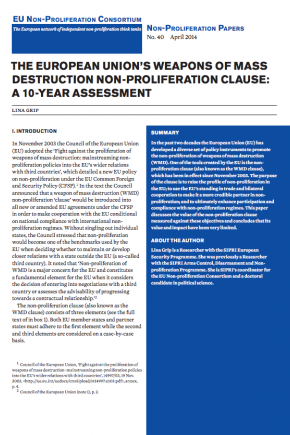The European Union's Weapons of Mass Destruction Non-proliferation Clause: A 10-year Assessment
In the past two decades the European Union (EU) has developed a diverse set of policy instruments to promote the non-proliferation of weapons of mass destruction (WMD). One of the tools created by the EU is the nonproliferation clause (also known as the WMD clause), which has been in effect since November 2003. The purpose of the clause is to raise the profile of non-proliferation in the EU; to use the EU’s standing in trade and bilateral cooperation to make it a more credible partner in nonproliferation; and to ultimately enhance participation and compliance with non-proliferation regimes. This paper discusses the value of the non-proliferation clause measured against these objectives and concludes that its value and impact have been very limited.

